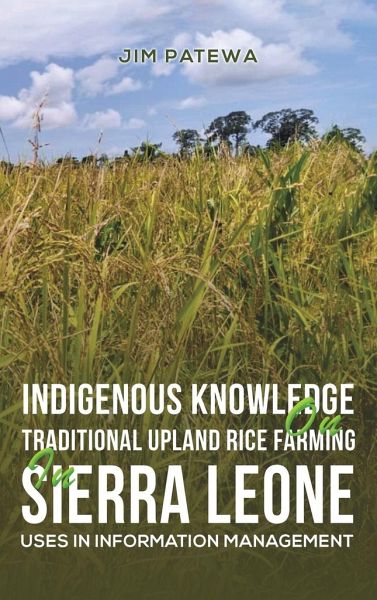Nicht lieferbar

Indigenous Knowledge on Traditional Upland Rice Farming in Sierra Leone
Versandkostenfrei!
Nicht lieferbar
"Learning can be acquired by reading books, but the much more necessary learning, the knowledge of the world, is only to be acquired by reading men, and studying all the various facets of them." (Phillip Stanhope, 4th Earl of Chesterfield). Indigenous Knowledge in Traditional Upland Rice Farming is a result of living and studying the rice farmers in the southern region of Sierra Leone, West Africa, over years of extension and rural development work. It is a result of years of effort trying to unearth how farmers generate and share information from their knowledge which remained unknown to prof...
"Learning can be acquired by reading books, but the much more necessary learning, the knowledge of the world, is only to be acquired by reading men, and studying all the various facets of them." (Phillip Stanhope, 4th Earl of Chesterfield). Indigenous Knowledge in Traditional Upland Rice Farming is a result of living and studying the rice farmers in the southern region of Sierra Leone, West Africa, over years of extension and rural development work. It is a result of years of effort trying to unearth how farmers generate and share information from their knowledge which remained unknown to professionals who attempt intervention projects aimed at addressing the constraints the farmers faced. These ventures often fail to get the desired results with a waste of time and resources due to the lack of knowledge and understanding on the underpinning knowledge in a system they want to correct. It gives an insight into this farming system in a way that can be applicable to other farming systems in the country and elsewhere around the world. Fortunately, the information collected into this book was done before the rebel war in Sierra Leone, which claimed the lives of the majority of the seasoned and knowledgeable farmers. There is currently a drive by the government of Sierra Leone to encourage entrepreneurship in agribusiness around the country to improve agriculture and food production, in order to alleviate the problem of food shortages in the country. This book offers an opportunity for those with the capital to grasp the fundamental principles underlying the practices in the farming system, the major source of food production in the country, as an insurance for their capital investments. This book can be translated into the local languages for the adult education of young farmers in the country who have not had the opportunity to have learned from their parents and older farmers through the method of oral traditional learning, as a result of the decade of rebel war which may have claimed their lives.




